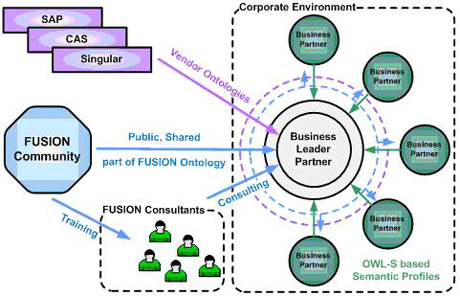by Spiros Alexakis and Alexa Schumacher
Small and medium enterprises (SMEs) cooperating with international partners in the enlarged Europe need holistic Enterprise Applications Integration (EAI) solutions in order to operate effectively. At the same time, they face intercultural barriers, since current interoperability and integration efforts are focused on data rather than on processes.
The aim of the FUSION project is to support collaboration and interconnection between commercial enterprises by developing a framework and innovative technology that allows the semantic fusion of heterogeneous service-oriented business applications. In particular, FUSION has a three-fold focus:
-
The development of an innovative approach, methodology and integration mechanism for the semantic integration of a heterogeneous set of business applications, platforms and languages within SMEs.
-
The integration of research activities carried out in the enlarged Europe in the areas of Business Process Management, Semantic Web and Web services.
-
The validation of research results by developing proof-of-concept pilots in collaborative commerce growth across semantically enriched value networks across the enlarged Europe.

FUSION will facilitate three trans-national business cases, typical examples of cross-organizational collaboration. The first is the integration of transactions of a franchising firm (Greece, Poland, Romania, Bulgaria, Ukraine, Cyprus and FYROM); the second pilot deals with the automation of international career and human resource management services (Hungary and Germany); the final example is a collaboration of companies in a chain of schools of foreign languages and computing (Bulgaria, FYROM, Albania).
The research project FUSION is led by SAP AG (Germany). Research activities are coordinated by the Institute of Communication and Computer Systems (ICCS, Greece). Pilot case execution is led by CAS Software AG (Germany), while validation of the research results is coordinated by the South-East European Research Centre (SEERC, Greece). In total, the FUSION consortium consists of fifteen partners from five European countries (Germany, Poland, Greece, Hungary and Bulgaria), including research institutes, technology developers, innovation transfer bodies and end users.
The FUSION solution will invoke the creation, administration and deployment of Web Services Instances of the pre-selected features of the enterprise applications and their semantic description (Semantic Profile). This is based on a business concept model called FUSION ontology that serves as a common reference and allows the semantic integration of the business applications. The deployed Web Services Instances will be published in a semantically enriched UDDI service registry, while the semantic profiles created for Web Services Instances will be registered in the FUSION semantically enriched registry. The latter is part of the FUSION Semantic Repository, powering the system-integrated categorization and discovery services.
We envision that in working with the FUSION solution, business analysts will:
-
define the concepts that exist inside the business application (eg product, contact, order etc) and use well-defined business ontologies/concept models that are independent from the technical architecture of the business application
-
associate the concepts and services with the business application repository/resources
-
create and administrate Web Services Instances, create semantic profiles of Web Services Instances and publish the profiles on the FUSION semantically-enriched registry
-
orchestrate aggregate compositions of Semantic Web services based on FUSION-enabled descriptions of various business applications.
To this extent, those involved in the FUSION System life cycle are IT consultants (who are responsible for extending the ontology with necessary concepts and annotating the Web services), business process consultants (who create generic processes that can be customized for more specific installations), and enterprise application software vendors (who adapt their products to the FUSION approach).
It is expected that the project results will include the following:
-
the FUSION approach for semantic service-oriented Business Application integration covering essential business processes between collaborative organizations
-
the FUSION methodology for semantic service-oriented Business Application Integration that will facilitate the integration of business software applications
-
the FUSION integration mechanism will simplify the interconnection of heterogeneous information systems, resource sharing and services provision
-
three FUSION cases will prove the concepts and tools of the solution, concerning three different enlarged Europe scenarios.
The project is supported by the European Commission (IST-027385).
Link:
http://www.fusionweb.org/
Please contact:
Spiros Alexakis
CAS Software AG, Germany
E-mail: Spiros.Alexakis![]() cas.de
cas.de










